#during the threat of the iran war like last year
Text
Biden's visit has concluded. Israel has spent his entire visit trying to muddy the waters of what happened to Al Ahli Hospital and despite their cartoonish efforts, it hasn't worked
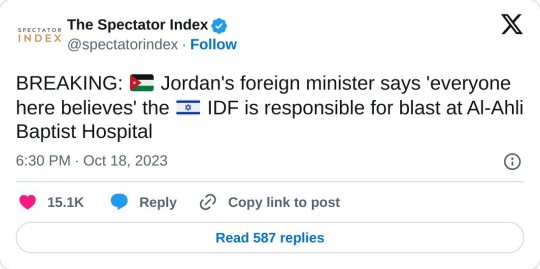
The Global South and especially West Asia know who is responsible for the bombing and no amount of AI voice recordings of 'Hamas operatives' can change that.
Israel war crimes continues to backfire on them even in America
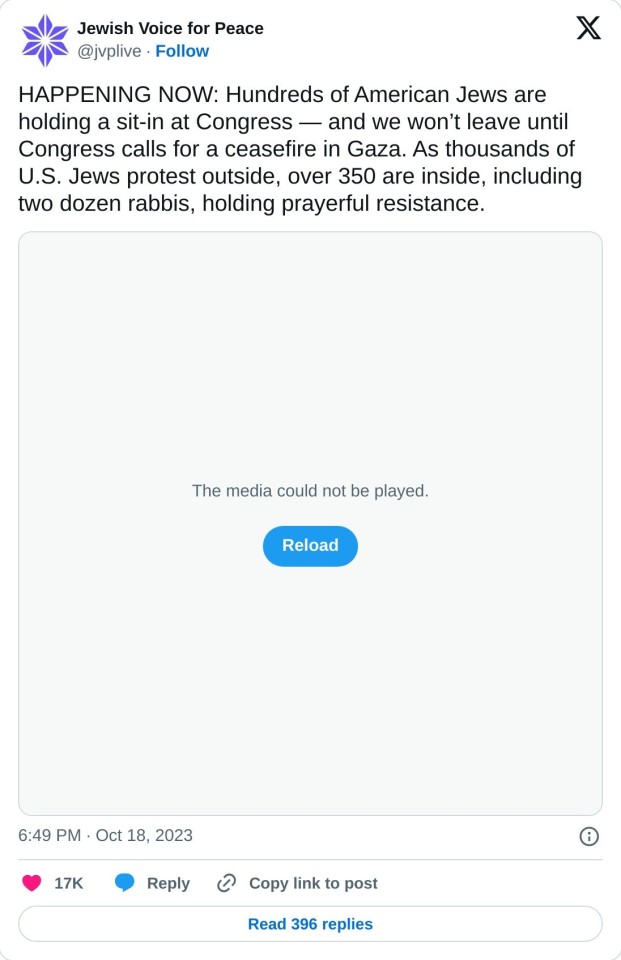
Biden backing Israel has had an impact on America's image. Here's a Wall Street Journal article warning that America's continued support is turning countries towards Russia and China which is code for turning countries against America
An EU official said that the EU will pay a heavy price in the Global South for its continued, unabashed support for Israel
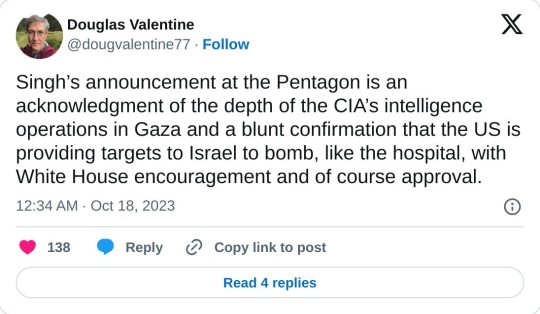
There's also speculation that the Biden administration knew about the bombing before it happened.
Countries that were/are allied with Israel continue to distance themselves from Israel like Russia. The reason I keep highlighting Russia is because the West has been running out of ammunition due to the Russia-Ukraine war and that includes Israel which is rumoured to have sent 80-90% of its ammunition to Ukraine. If this conflict lasts a long time, Israel will need to buy weapons and ammunition and Russia would be one of the countries they would turn to (same with China)
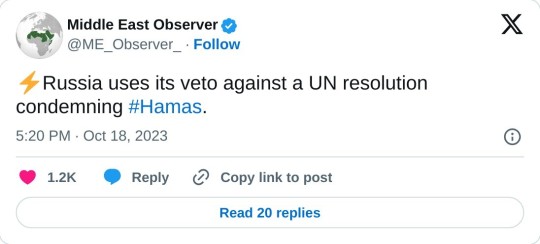
So, where are we in terms of the conflict? After days of waffling over a ground operation in Gaza, Israel postponed it until some time after Biden's visit and now we're back here again
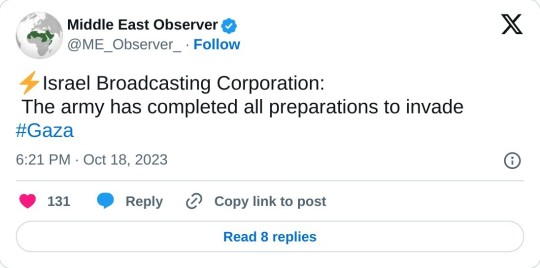

Now I'm no military expert but constantly going back and forth on whether or not you'll invade Gaza is bound to do damage to your troops' morale. No wonder they're dealing with mass desertions while their citizens demonstrate on the streets. The Israeli leadership has no plan besides bombing Gaza.
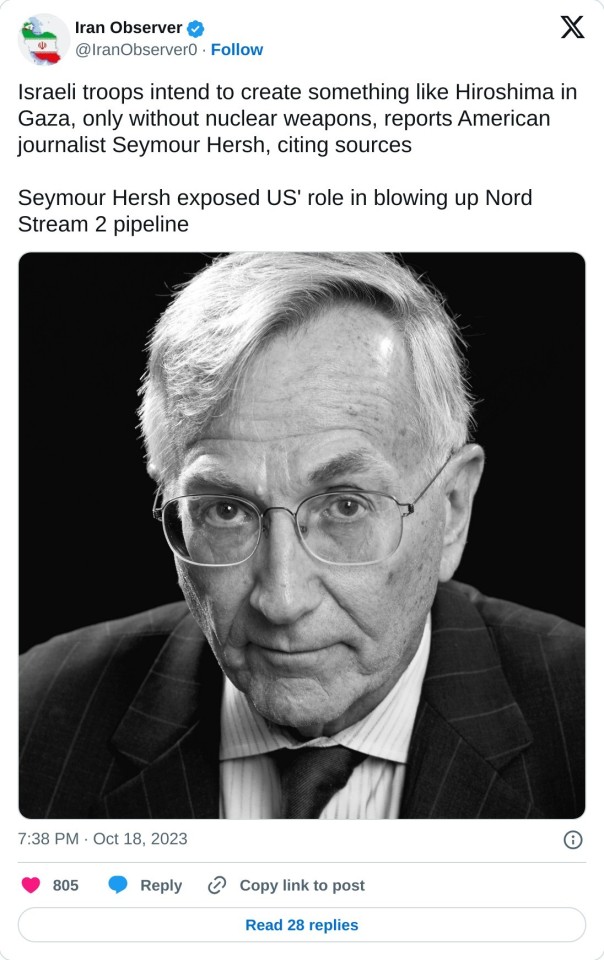
I've seen people on twitter say that the hospital bombing was done deliberately to normalise IDF soldiers to mass civilian deaths in places like hospitals, schools, places of worship, etc. I don't know if I believe that - I think they wanted to push Iran and Hezbollah's buttons before hiding behind Biden. I don't think these people are thinking strategically.
As far as the possibility of regional war is concerned, all indicators show that the West preparing for the war to escalate
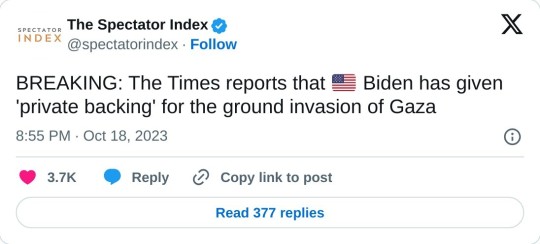

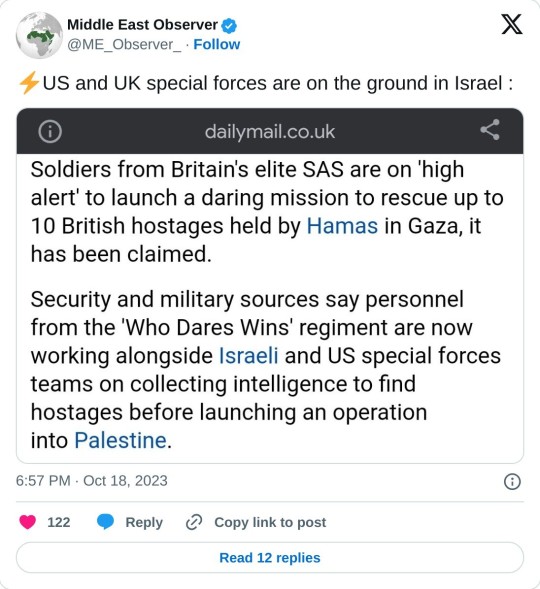
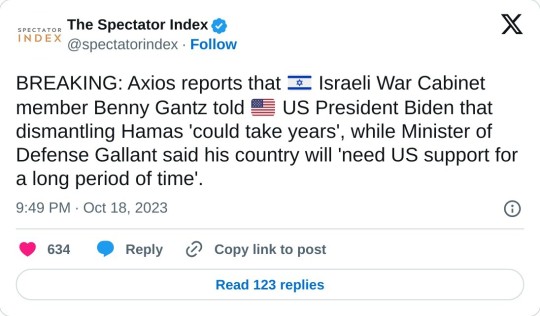
Seems to me the Israel has seen what Ukraine has received in just a year and a half of war. They're done receiving a paltry 3.8 billion every year and now prepared to drag out the conflict and I can't say I blame with Biden proposing a 100 billion package for both Ukraine and Israel. This will stretch America too thin as far as funding in concerned. Cracks are already showing
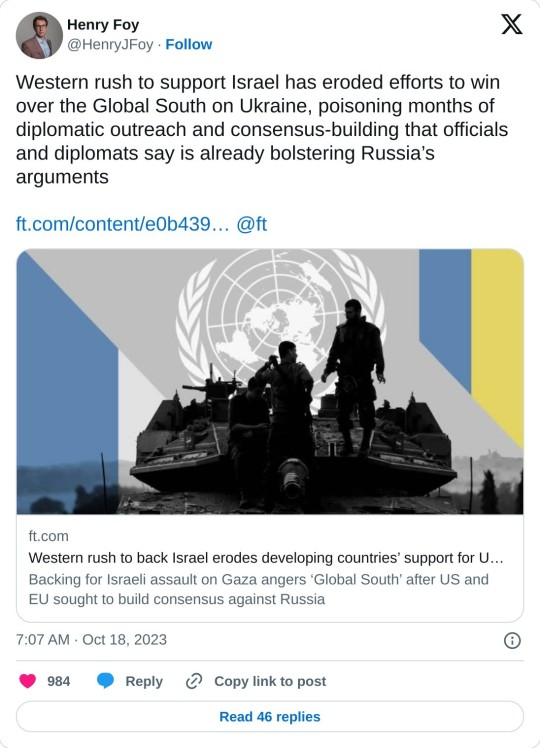
There are parts of the US government that is unhappy that the Ukraine war is losing attention. During the Ukraine war, you had parts of the government that wanted focus to shift from Russia to China. Because of that, the US government has spent the past year alternating between hostility to Russia and threatening to go to war with China over Taiwan. When Niger expelled France from within its borders, America was preparing to join that conflict until Mali and Burkina Faso declared they would fight with Niger. Now they're entering a third front in West Asia. In short, the mighty empire is expending a lot of resources right now and it is not the threat it was when it invaded Iraq and Afghanistan in the early 2000s.
At any rate, the ground invasion of Gaza won't go the way Israel and America hopes it will
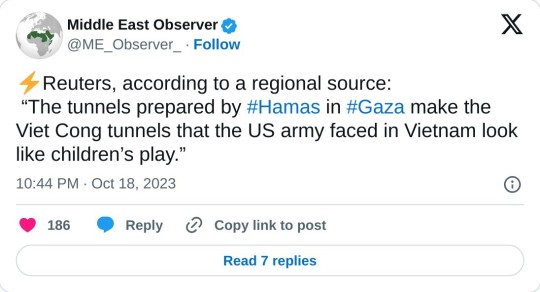
The coalition of Palestinian resistance fighters are still patiently waiting for the IDF to come meet them. Their allies aren't backing down either
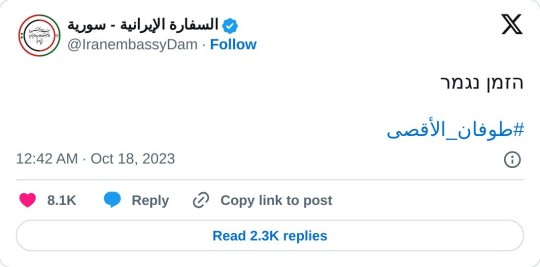

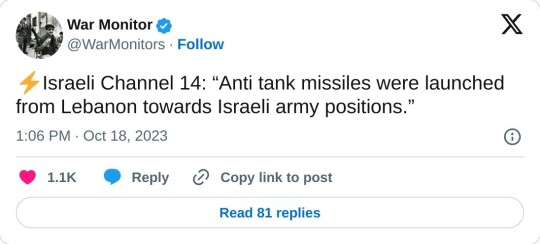
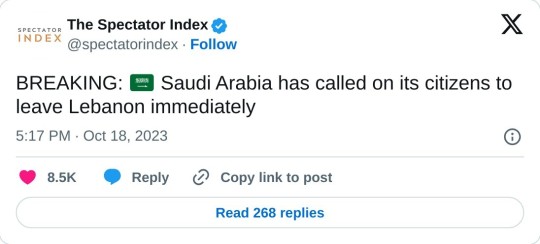
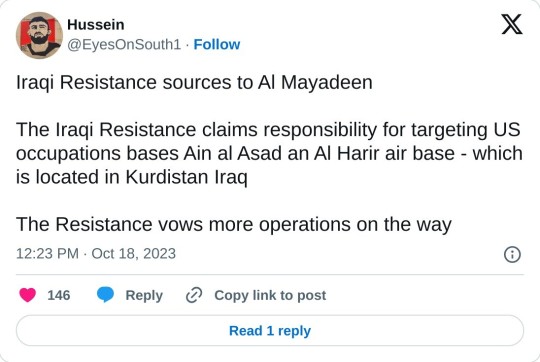
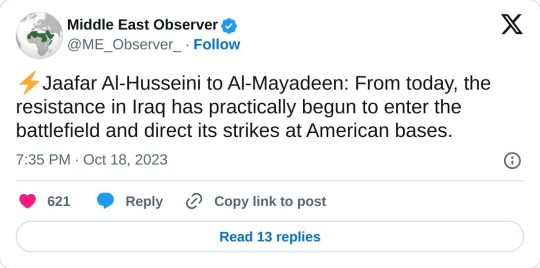
The reason I keep making these posts is to remind people that, while the genocide of the people of Gaza is horrifying, the war for the liberation of Palestine has not yet been lost.
Do not lose hope. From the river to sea, Palestine WILL be free
1K notes
·
View notes
Text
By BEATRICE SAYERS
An event in London last week to mark the exodus and expulsion of Jews from Arab countries became an opportunity to counter the current far-left narrative that paints Israel as a country of white settlers.
Organiser Lyn Julius, who runs Harif, the association of Jews from the Middle East and North Africa, told the audience at JW3 that 50 percent of Jews in Israel have roots in Arab and Muslim countries. They had not left those countries willingly, she added, and many left as a result of massacres.
“Families butchered like sheep, bodies buried in the debris of homes in which pogromists had locked the families before setting them on fire. Jewish girls raped, their breasts cut off. No, I am not describing 7 October 2023,” Julius said. “We have been here before. It’s an anti-Jewish atrocity which occurred in Constantine, Algeria, in 1934. But I could have cited any number of similarly barbaric atrocities: in Fez, Morocco, in 1912, in Tripoli, Libya, in 1945, in Iraq in 1941 the Farhud, which claimed the lives of at least 179 Jews.”
She pointed out that Israel was “the solution to pre-existing antisemitism” that had led to pogroms across the region. “In a generation and a half almost all the ancient, pre-Islamic Jewish communities of the Middle East and North Africa have been ethnically cleansed. Hamas simply wants to finish the job. From almost a million Jews in 1948, only about 4,000 remain, and that number dwindles year by year.”
Julius herself is the child of parents who came to Britain from the Iraqi capital Baghdad in 1950. A film shown at the event presented testimony from Jews who had been forced out of their native counties in the Middle East and North Africa.
Jocelyne Shrago is one of the four people interviewed in the film, commissioned from Daisy Abboudi, deputy director of the oral history archive Sephardi Voices UK.
Shrago, who was born in Algeria, told how during the Constantine pogrom her parents and sister went over the wall to the Arab family who lived next door, who saved them. She recalls the bombing campaign during the Algerian war of independence in the 1950s, when she covered her baby niece with her body to protect her. “People had to leave in ‘62 because on the walls there was graffiti that said ‘La valise ou le cercueil’, ‘the suitcase or the coffin’.” Some went to Israel. Her family on both sides went to France, where she lived until 1968, when she moved to the UK.
Other speakers at the event last Thursday, the ninth that Harif has organised, included Baroness (Ruth) Deech, Joseph Dweck, senior rabbi of the S&P Sephardi Community, Marie van der Zyl, president of the Board of Deputies, Claudia Mendoza, chief executive of the Jewish Leadership Council, and the Israeli ambassador Tzipi Hotovely. The ambassador said Mizrachi Jews were not just 50 percent of Israel’s population but had shaped her history. “Israel today is a very healthy mix between west and east.”
Mendoza spoke movingly about her mother’s family, who are from Aden. They were forced to flee and her grandfather was murdered. “The clarity with which my family speak when they talk about threats to your life because you’re a Jew resonate more than ever today. They have seen it before and they do not have the luxury of denalism.”
But she also had a powerful and uplifting message to the Jewish community, and warned it not catastrophise or retreat into itself.
“The polling that we’ve done at the JLC [Jewish Leadership Council] after the October 7 attack shows that while there may be a small number of extremists in the UK who support Hamas, and they must be called out, the vast majority of British people recognise them for the murderous terrorists that they are and they reject those that wish to target jews here in the UK.
“If we fight as if we are surrounded exclusively by enemies, we risk by that very attitude making enemies we didn’t previously have, and losing friends whose sympathies we fail to notice. We have so many friends, I promise you that.”
34 notes
·
View notes
Text
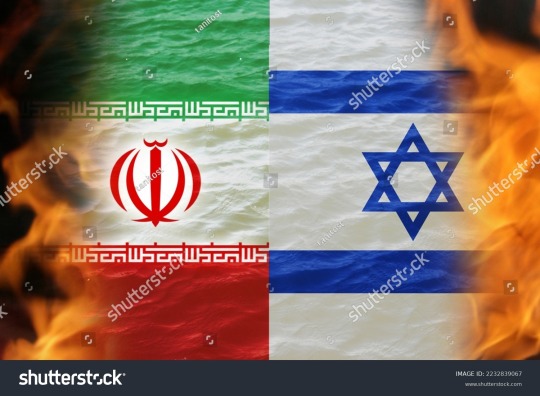
🇮🇷⚔️🇮🇱 🚨
IRANIAN FOREIGN MINISTER TO GERMAN FOREIGN MINISTER: PUNISHING ZIONIST REGIME A NECESSITY, GALLANT THREATENS FURTHER RETALIATION, WAR LOOMS OVER REGION
Speaking with the German Foreign Minister, Annalena Baerbock, on Thursday, Iran's Foreign Minister, Hossein Amir-Abdollahian, told his German counterpart that the "legitimate defense with the aim of punishing the aggressor is a necessity," following the Israeli occupation's April 1st airstrike on the Consulate section of the Iranian embassy in Damascus, Syria, that killed 7 Iranian personnel, including two high-ranking Generals with the IRGC's elite Quds Force.
Iran has since vowed revenge on the Israeli regime, with Iranian Supreme leader, Ayatollah Seyyed Ali Khamenei saying during an Eid al-Fitr sermon on Wednesday that the Israeli occupation "should and will be punished" for their "mistake," later adding that the Israelis would "regret the crime" and would soon be "punished at the hands of our brave men."
Meanwhile, United States President Joe Biden reaffirmed his commitment to the defense of the Zionist regime, saying during a news conference on Wednesday that "Our commitment to Israel’s security against these threats from Iran and its proxies is ironclad." (Biden also used the same phrase to reaffirm U.S. military support for the Philippines on Thursday, in the event of a territorial dispute with China in the South China Sea)
Meanwhile, United States Defense Secretary, Lloyd Austin, spoke by phone with Israeli Defense Minister, Yoav Gallant.
During their conversation, the US Defense Secretary used identical language in reaffirming, “ironclad US support for Israel’s defense in the face of growing threats from Iran and its regional proxies.”
“Secretary Austin assured Minister Gallant that Israel could count on full US support to defend Israel against Iranian attacks, which Tehran has publicly threatened,” the readout adds.
The Israeli Defense Minister, for his part, told his American counterpart that any "direct Iranian attack will require an appropriate Israeli response against Iran.
“The State of Israel will not tolerate an Iranian attack on its territory," Gallant added.
Meanwhile, two anonymous Biden administration officials told Politico that they expect Iran was "calibrating its plans for a major retaliatory strike against Israel to send a message — but not spark a regional war that compels Washington to respond."
The two officials told Politico that the Biden administration expects Iran is preparing for a "larger-than-usual" strike on the Israeli entity "in the coming days," adding that the assault is likely to consist of combined missile and drone strikes.
However, according to Politico:
Neither official said they were fully confident Iran will succeed in striking Israel in a way that doesn’t prompt the U.S. to respond militarily, as any attack increases the risk of a greater conflagration in the Middle East. But Iran doesn’t seek to expand the regional crisis further, the Biden administration has long determined, which the officials said may be weighing on Tehran’s planning.
The decisions and behaviors of the United States over the last six months has not been without consequences it would seem, as Joe Biden's refusal to set limits on the Israeli occupation has allowed the Zionist regime to turn Gaza into smoldering blood bath killing and wounding well over 100'000 Palestinians, while in the north, the occupation is on the verge of outbreak of war with Hezbollah, which has already resulted in hundreds of thousands of Israeli colonial settlers in the north of the occupied Palestinian territories to become displaced.
At the same time extremely rash and irrational actions such as the strike on the Iranian embassy, moves meant to spark a larger conflagration, have brought us to the edge of a regional war, looming over the Zionist regime while threatening to blow up in the Biden administration's faces during an election year, dragging the United States into massive war that it cannot win in the long-run.
Even while all this occurs in West Asia, the Biden administration continues its Neocon policies throughout the world, threatening multiple crises in places as far flung as the Philippines, Ukraine, and Haiti, yet the bombast and threats will seem to continue into either the administration is removed from power, or third world war is triggered.
After, what else would we call regional wars sparked in every region of the world?
April 12th, 2024.
#source1
#source2
#source3
#source4
#source5
#source6
@WorkerSolidarityNews
#iran#iran news#iranian news#Iranian politics#israeli occupation#israel#israeli war crimes#israeli crimes#united states#us news#joe biden#biden administration#biden white house#regional war#middle east#middle east war#israeli genocide#palestine#palestinians#axis of resistance#politics#news#geopolitics#world news#global news#international news#war#breaking news#current events#us politics
10 notes
·
View notes
Text
Exclusive: Iran alerted Russia to security threat before Moscow attack
DUBAI, April 1 (Reuters) - Iran tipped off Russia about the possibility of a major "terrorist operation" on its soil ahead of the concert hall massacre near Moscow last month, three sources familiar with the matter said.
In the deadliest attack inside Russia in 20 years, gunmen opened fire with automatic weapons at concertgoers on March 22 at the Crocus City Hall, killing at least 144 people in violence claimed by the Islamic State militant group.
The United States had also warned Russia in advance of a likely militant Islamist attack but Moscow, deeply distrustful of Washington's intentions, played down that intelligence.
It is harder, however, for Russia to dismiss intelligence from diplomatic ally Iran on the attack, which has also raised questions over the effectiveness of Russian security services. Moscow and Tehran, both under Western sanctions, have deepened military and other cooperation during the two-year Ukraine war.
"Days before the attack in Russia, Tehran shared information with Moscow about a possible big terrorist attack inside Russia that was acquired during interrogations of those arrested in connection with deadly bombings in Iran," one of the sources told Reuters.
Iran arrested 35 people in January, including a commander of Islamic State's Afghanistan-based branch ISIS-Khorasan (ISIS-K), who it said were linked to twin bombings on Jan. 3 in the city of Kerman that killed nearly 100 people.
Islamic State claimed responsibility for the Iran blasts, the bloodiest since the 1979 Islamic Revolution. U.S. intelligence sources said ISIS-K had carried out both the Jan. 3 attacks in Iran and the March 22 shootings in Moscow.
Islamic State once occupied large swathes of Iraq and Syria, imposing a reign of terror and inspiring lone wolf attacks in Western countries, but was declared territorially defeated in 2017.
However ISIS-K, one of its most fearsome branches, has raised the group's profile again with large-scale bloodshed.
ISIS-K, named after an old term for a region that encompassed parts of Iran, Turkmenistan and Afghanistan, emerged in eastern Afghanistan in late 2014 and quickly established a reputation for extreme brutality.
'SIGNIFICANT OPERATION'
A second source, who also requested anonymity due to the sensitivity of the issue, said the information Tehran provided to Moscow about an impending attack had lacked specific details regarding timing and the exact target.
"They (the members of ISIS-K) were instructed to prepare for a significant operation in Russia... One of the terrorists (arrested in Iran) said some members of the group had already travelled to Russia," the second source said.
A third source, a senior security official, said: "As Iran has been a victim of terror attacks for years, Iranian authorities fulfilled their obligation to alert Moscow based on information acquired from those arrested terrorists."
Asked about the Reuters report, Kremlin spokesman Dmitry Peskov said on Monday: "I do not know anything about this."
Iran's foreign ministry did not reply to a request for comment on this story. The White House had no comment on the matter.
A source familiar with the U.S. intelligence on an impending attack in Russia said it was based on interceptions of "chatter" among ISIS-K militants.
Challenging the U.S. assertions, Russia has said it believes Ukraine was linked to the attack, without providing evidence. Kyiv has strongly denied the assertion.
TAJIK NATIONALS
The attacks in Kerman and near Moscow both involved Tajik nationals. ISIS-K has aggressively recruited from the impoverished former Soviet republic of Tajikistan, security experts say.
Sources said Iran had discussed its security concerns with Tajikistan. A diplomatic source in Tajikistan confirmed that Tehran had recently discussed with Dushanbe the issue of increased involvement of ethnic Tajiks in militant activities.
Islamic State harbours a virulent hatred for Shi'ites -- Iran's dominant sect and also the target of its affiliate's attacks in Afghanistan. The hardline Sunni Muslim group views Shi'ites as apostates.
In 2022 Islamic State claimed responsibility for a deadly attack on a Shi'ite shrine in Iran that killed 13 people. Tehran identified the attacker as a Tajik national.
Earlier attacks claimed by Islamic State include twin bombings in 2017 that targeted Iran's parliament and the tomb of the Islamic Republic's founder, Ayatollah Ruhollah Khomeini.
7 notes
·
View notes
Text
2. The Iranian Role
As CAMERA’s Sean Durns wrote nearly a year ago, “The decline of the PA’s influence, and the commensurate rise of Iranian-sponsored rivals, is newsworthy.”
With the PA unable to exert its authority over parts of the West Bank, Iran’s proxy forces have filled the vacuum, and the Iranian regime has exploited the situation to wage war against the Jewish state. Yet these significant trends have been left largely unreported by international media outlets.
Iran isn’t trying to hide its nefarious actions in Israel. Just a few days ago, Palestinian Islamic Jihad’s leader, Ziyad al-Nakhalah, confirmed that Iran was arming terrorists in the West Bank, and that this was at the direct instruction of Iranian Supreme Leader Ali Khamenei.
Last year, the commander of Iran’s Revolutionary Guard Corps, Hossein Salami, boasted of Iran’s efforts in “arming the West Bank … to defeat Israel.” Further demonstrating Abbas’ inability to exert control, according to a PA official, terrorists belonging to Fatah — Mahmoud Abbas’ own party — are “on the payroll of Iran and its Palestinian proxies.”
3. The Growing Threat of IEDs
The danger that has been emanating from Jenin is not just a matter of quantity, but also quality. A new threat has been emerging: that of improvised explosive devices (IEDs).
Just last month, one such explosive device — planted by the Iranian proxy group Islamic Jihad — wounded eight IDF soldiers.
This deadly tactic that American soldiers once faced in places like Iraq — which the Iranian regime also had a role in — has now become an increasingly common and serious threat to Israelis. But instead of the IED threat being in a foreign theater on the other side of the world as it was for Americans, this IED threat is in Israel’s own home, threatening its soldiers and civilians alike.
Since the operation began in Jenin, the IDF has captured “explosives manufacturing facilities” containing “hundreds of explosive devices, along with a guidebook on how to make additional explosive devices.”
18 notes
·
View notes
Text
The MEK began as a revolt against the dictatorship of Iran’s last Shah in 1965, espousing left-leaning Marxist rebellion ideologies. Though it shared the shah as a common enemy with Ayatollah Khomeini’s Islamic Republic, the leftist worldview of the MEK was in sharp contrast to Khomeini’s Islamist visions. When the shah fell in 1979, the MEK became one of the few threats to Khomeini and his Revolutionary Guard Corps’ power, with nearly as many followers.[...]
Many survivors point to one individual as the central figure in the decade of terror: Ebrahim Raisi, the current president of Iran. Beginning in 1985, Raisi was the deputy prosecutor and then prosecutor of Tehran. Raisi led a relentless campaign against groups suspected of opposing the new Iranian government, with the MEK at the center of his crosshairs.[...]
MEK remains a designated terrorist organization in Iran and was classified as a Foreign Terrorist Organization (FTO) in the United States for 15 years. In 1997, the Clinton administration slapped MEK, which had a Washington office at the time, with the label — along with 29 other foreign groups — essentially freezing its assets and initiating travel bans on its members. This was widely considered a “goodwill gesture to Iran,” in which Tehran pledged to label the growing Lebanese militia Hezbollah with the same terrorist title on its turf, only that promise was broken.
Even during its time as an FTO, however, members of MEK were deemed “protected persons” by Washington under the Geneva Convention, given that a large swath of its members — who would have faced death in Iran — had fled to Iraq, aligning themselves with the government of Saddam Hussein during his war with the Iranian regime. The group founded the Ashraf 1 and Ashraf 2 camps on the edges of Baghdad.
The MEK’s evolution as a US-aligned dissident group was propelled by Saddam’s ouster after the US invasion in 2003. The encampments came under the protection of the US military, and American troops instead stood guard at the gates.
But after the protection designation expired in 2009, the US handed full sovereignty to the Shiite-dominated new Iraqi government, then led by Nouri al-Maliki. As a result, the MEK was soon in the line of fire from their new “protectors,” Iraqi forces with ties to Tehran. Bombs and bullets rained down on the unarmed compounds in 2012 and again in 2013, killing dozens. Iraqi forces assaulted the camps, survivors say, taking hostages.
In Washington, the MEK made allies with anti-Iran Republicans, who lobbied to have the group removed from the State Department’s list of terrorist organizations in 2012.
In 2016, the group built Ashraf 3 in the quiet plains of the Albanian countryside, welcomed by the government in the Albanian capital of Tirana as it sought closer ties with Washington.[...]
Today, the MEK enjoys influence in Washington’s foreign policy and lobbying circles. The organization gained prominent footing under the administration of President Donald Trump, given the administration’s push to isolate Tehran from the international playing field through a “maximum pressure” campaign with support from the likes of Trump’s national security advisor John Bolton, as well as Rudy Giuliani and Newt Gingrich.
In 2018, The New York Times ran a story headlined “M.E.K.: The Group John Bolton Wants To Rule Iran.” That same year, Bolton, Giuliani, and Gingrich attended the group’s annual convention in Villepinte, outside Paris, held under the banner of the MEK’s political wing, the National Council of Resistance of Iran.
But the event made headlines for a foiled Iranian bomb plot. An Iranian diplomat in Brussels was arrested and sentenced to 20 years in prison for attempting to smuggle explosives into the event.[...]
Those in Ashraf 3 maintain that their revolution is nonviolent and say they believe in “small steps” inside their country. On Jan. 27, 2022, disruptors briefly hacked state-controlled television channels simultaneously with images of the Rajavis.
A few weeks earlier, with much fanfare to mark the second anniversary of his death, the regime unveiled a giant fiberglass statue of Qassem Soleimani, the shadowy Iranian spymaster bombed in Baghdad under Trump’s direction.
But just hours after it was erected in the southwestern Iranian city of Shahrekord, mysterious assailants torched the prized effigy to the ground.
“These acts are important,” one MEK member says with a smile. “People are no longer afraid.”
17 notes
·
View notes
Text
Exclusive: Iran alerted Russia to security threat before Moscow attack (Reuters)
DUBAI, April 1 (Reuters) - Iran tipped off Russia about the possibility of a major "terrorist operation" on its soil ahead of the concert hall massacre near Moscow last month, three sources familiar with the matter said.
In the deadliest attack inside Russia in 20 years, gunmen opened fire with automatic weapons at concertgoers on March 22 at the Crocus City Hall, killing at least 144 people in violence claimed by the Islamic State militant group.
The United States had also warned Russia in advance of a likely militant Islamist attack but Moscow, deeply distrustful of Washington's intentions, played down that intelligence.
It is harder, however, for Russia to dismiss intelligence from diplomatic ally Iran on the attack, which has also raised questions over the effectiveness of Russian security services. Moscow and Tehran, both under Western sanctions, have deepened military and other cooperation during the two-year Ukraine war.
"Days before the attack in Russia, Tehran shared information with Moscow about a possible big terrorist attack inside Russia that was acquired during interrogations of those arrested in connection with deadly bombings in Iran," one of the sources told Reuters.
Read more
0 notes
Text

“SLAVA UKANINl” -- As Zelensky Brings The Stature And Face of Freedom To Washington
WASHINGTON -- He entered Washington less than 24 hours after appearing with his front-line troops in a city under war zone fire. He presented Congress with a Ukrainian battle flag, given to him on Tuesday in that frontline city of Bakhmut in eastern Ukraine and signed by the troops.
And Volodymyr Zelensky met the opportunity to talk to Washington and take its attention fully using resolute, captivating, humor, history and magnetism.
"We stand united," he said.
His address to Congress, which lasted 24 minutes, was the first time a foreign leader addressed Congress during wartime since Winston Churchill did so in 1941 during World War II. The trip to Washington was also the first known time Zelensky has left Ukraine since Russia invaded in late February.
“Just like the Battle of Saratoga, the fight for Bakhmut will change the trajectory of our war for independence and for freedom,” he said at one point - gambling that Americans know their own history.
“They threw everything against us, similar to the other tyranny, which is in the Battle of the Bulge, threw everything it had against the free world. Just like the brave American soldiers which held their lines and fought back Hitler’s forces during the Christmas of 1944, brave Ukrainian soldiers are doing the same to Putin’s forces this Christmas,” he added.
He also connected Russia to one nation considered by the GOP to be a danger to the U.S. “Russia found an ally in this genocidal policy — Iran,” Zelensky said. “Iranian deadly drones sent to Russia in the hundreds became a threat to our critical infrastructure. That is how one terrorist has found the other.”
At another point in his speech, Zelensky noted the skills of Ukrainian soldiers when it comes to operating U.S. weaponry. “Ukraine never asked the American soldiers to fight on our land instead of us. I assure you that Ukrainian soldiers can perfectly operate American tanks and planes themselves,” he said, leading to laughs and claps in the chamber.
As Zelensky wrapped up his speech, you could hear shouts of “Slava Ukraini,” which means “glory to Ukraine,” in the chamber.
“I hope my words of respect and gratitude resonate in each American heart,” Zelensky said. “Your money is not charity. It’s an investment in the global security and democracy that we handle in the most responsible way.”
He said that "Our two nations are allies in this battle. And next year will be a turning point, I know it, the point when Ukrainian courage and American resolve must guarantee the future of our common freedom. The freedom of people who stand for their values.”
Earlier, at the end of Wednesday’s news conference, Biden sought to reassure Zelensky, telling him, “You don’t have to worry. We are staying with Ukraine as long as Ukraine is there.”
Zelensky said that Ukraine had “already offered proposals.” He did not say what they were, but he said he had discussed them with Biden, the president was supportive of them, and they included 10 points for “our joint security.” There was also mention of a summit.
Asked about the idea of a “just peace,” he mused on what that phrase might mean for his compatriots who had lost family members to Russian aggression. “You know how many parents lost their sons, daughters on the front lines? So what is just peace for them? Money is nothing, and no compensations or reparations are of no consequence,” he said at the press conference.
Before the visit, senior administration officials told reporters that the visit would be “an important injection of momentum.” That theory will now be tested.
0 notes
Video
youtube
Dangerous.. Russia begins to enter the war from the southern gate, and America begins to move
Updates on the Al-Aqsa Flood operation presented in this episode of Samri Channel.
Starting with the Syrian news website “Sawt Al-Asimah,” which said in a special report under the title: “Russia allows Tehran to use the Hmeimim Air Base”: “A plane belonging to Mahan Air, which is linked to the Iranian Revolutionary Guard, landed yesterday afternoon, Thursday, November 2nd, at the airport.” Latakia International Airport coming from the Iranian capital, Tehran.
The sources confirmed that Russia gave the green light to Iran to use Latakia International Airport, known as Hmeimim Airport, which is largely under full Russian control, after weeks of negotiation, during which Russia refrained from allowing Iranian aircraft to transport weapons through its airport, following the repeated exits from Aleppo and Damascus airports. Out of service as a result of Israeli strikes. Israeli media quoted sources at Mehrabad Airport in Tehran that the plane carried five tons of ammunition to Syria, likely to be shoulder-mounted anti-aircraft missiles.
The Wall Street Journal said yesterday, citing American sources, that the United States learned of the Russian Wagner militia supplying the Hezbollah militia with shoulder-fired missiles. CNN said that Bashar al-Assad agreed to send a missile system to Hezbollah with the help of the Russian Wagner militia. Damascus and Aleppo airports were out of service as a result of several Israeli strikes during the month, the first of which was on October 12, days after the outbreak of confrontations between Palestinian factions and Israel, which prompted the Ministry of Transport to transfer scheduled flights through the two airports to Hmeimim Airport in Latakia.
On the other hand, two sources familiar with Hezbollah's arsenal said that the powerful Russian anti-ship missiles obtained by the Lebanese group provide it with a means to implement the veiled threat made by its leader against American warships and highlight the serious risks of any war in the region. Hezbollah Secretary-General Hassan Nasrallah warned Washington last week that his group has something in store for American ships deployed in the region since the outbreak of war last month between the Palestinian Islamic Resistance Movement (Hamas) and Israel, which is shaking the wider Middle East region. The two informed sources in Lebanon said that Nasrallah was referring to the group's greatly enhanced anti-ship missile capabilities, which include the Russian Yakhont missile, which has a range of up to 300 kilometers.
Media reports and analysts have indicated for years that Hezbollah, which is backed by Iran, acquired Yakhont missiles in Syria after deploying its fighters there more than a decade ago to aid President Bashar al-Assad in the civil war. Hezbollah has never confirmed that it possesses this weapon. The Shiite group's media office has not yet responded after being contacted to comment on this story. Washington says that its deployment in the Mediterranean, which includes two aircraft carriers with their supporting ships, aims to prevent the expansion of the conflict by deterring Iran, which supports groups including the Palestinian Hezbollah, Hamas, and Islamic Jihad.
Hezbollah considers American warships a direct threat because of their ability to strike the group and its allies. Nasrallah said in a speech on Friday that US warships in the Mediterranean “do not frighten us and have never frightened us.” He added, "The fleets that you threaten us with, we have prepared for them as well." The White House said after Nasrallah delivered his speech that Hezbollah should not take advantage of the war between Hamas and Israel and that the United States does not want the conflict to spread to Lebanon. One of the sources said that Hezbollah's anti-ship capabilities have developed significantly since 2006, when the group demonstrated for the first time its ability to strike a ship at sea by hitting an Israeli warship in the Mediterranean Sea during its war with Israel.
#Palestine
#Russia
#Gaza
0 notes
Text
The neo-conservatives want to blame Iran for the current war in Palestine/Gaza.
They have for years tried to instigate war against it. Now they again see a chance. But its not a big one - yet.
Yossi Melman is a very well connected Israeli author:
Yossi Melman @yossi_melman - 5:33 UTC · Oct 9, 2023
IDF spokeperson Brig-General Danny Hagari said that there is no indication of an Iranian involvement in the war in Gaza.
---
Biden administration scrambles to deter wider Mideast conflict - Washington Post - Oct 8 2023
Asked whether Hamas may have acted in partnership with Iran to disrupt the effort to broker a Saudi deal, Blinken said “that could have been part of the motivation. Look, who opposes normalization? Hamas, Hezbollah, Iran.”
But, he said, “we have not yet seen evidence that Iran directed or was behind this particular attack.”
---
Fear not, say the neocons, we still have the Wall Street Journal to carry water for us:
Iran Helped Plot Attack on Israel Over Several Weeks (archived) - Wall Street Journal - Oct 8 2023
DUBAI—Iranian security officials helped plan Hamas’s Saturday surprise attack on Israel and gave the green light for the assault at a meeting in Beirut last Monday, according to senior members of Hamas and Hezbollah, another Iran-backed militant group.
Officers of Iran’s Islamic Revolutionary Guard Corps had worked with Hamas since August to devise the air, land and sea incursions—the most significant breach of Israel’s borders since the 1973 Yom Kippur War—those people said.
Details of the operation were refined during several meetings in Beirut attended by IRGC officers and representatives of four Iran-backed militant groups, including Hamas, which holds power in Gaza, and Hezbollah, a Shiite militant group and political faction in Lebanon, they said.
WSJ authors in Dubai(!) have access to "senior members of Hamas and Hezbollah"?
Both groups are notorious for their secrecy and their senior leadership is usually hidden away. Those facts alone are enough to debunk the report as nonsense. But the WSJ authors continue:
“We don’t have any information at this time to corroborate this account,” said a U.S. official of the meetings.
A European official and an adviser to the Syrian government, however, gave the same account of Iran’s involvement in the lead-up to the attack as the senior Hamas and Hezbollah members.
Asked about the meetings, Mahmoud Mirdawi, a senior Hamas official, said the group planned the attacks on its own. “This is a Palestinian and Hamas decision,” he said.
A spokesman for Iran’s mission to the United Nations said the Islamic Republic stood in support of Gaza’s actions but didn’t direct them.
“The decisions made by the Palestinian resistance are fiercely autonomous and unwaveringly aligned with the legitimate interests of the Palestinian people,” the spokesman said. “We are not involved in Palestine’s response, as it is taken solely by Palestine itself.”
Three direct rejections by official sources of the WSJ claims get countered with an anonymous 'European official' and a likewise anonymous 'adviser to the Syrian government'.
It is like the authors don't even try to sound believable:
A direct Iranian role would take Tehran’s long-running conflict with Israel out of the shadows, raising the risk of broader conflict in the Middle East. Senior Israeli security officials have pledged to strike at Iran’s leadership if Tehran is found responsible for killing Israelis.
The IRGC’s broader plan is to create a multi-front threat that can strangle Israel from all sides—Hezbollah and the Popular Front for the Liberation of Palestine in the north and Palestinian Islamic Jihad and Hamas in Gaza and the West Bank, according to the senior Hamas and Hezbollah members and an Iranian official.
...
Israel has blamed Iran, saying it is behind the attacks, if indirectly. “We know that there were meetings in Syria and in Lebanon with other leaders of the terror armies that surround Israel so obviously it’s easy to understand that they tried to coordinate. The proxies of Iran in our region, they tried to be coordinated as much as possible with Iran,” Israel’s ambassador to the United Nations, Gilad Erdan, said Sunday.
There is however little evidence for the Israeli assertion:
Leading the effort to wrangle Iran’s foreign proxies under a unified command has been Ismail Qaani, the leader of the IRGC’s international military arm, the Quds Force.
Qaani launched coordination among several militias surrounding Israel in April during a meeting in Lebanon, The Wall Street Journal has reported, where Hamas began working more closely with other groups such as Hezbollah for the first time.
Hamas and Hezbollah have cooperated for decades. During the war on Syria some Hamas members took the side of the 'moderate rebels'. They taught them how to dig large tunnels, a technique they themselves had once learned from Hizbullah:
Abu Musaab, a leader in Ahrar al-Sham, told the pro-uprising satellite television station Orient News that the Syrian militant group received tutorial videos from Gazans showing them how to repair collapsing tunnels.
"The ground here became damp and began to fall on us…and some of our youth were trapped inside. So we spoke to those with expertise, our brothers in Gaza, may God reward their good deeds," Abu Musaab was quoted as saying.
"We consulted them regarding the problem and they advised us to bring in wood (plates), sending us video segment showing us how they do it and we replicated that," Abu Musaab added.
...
And in June 2013, the pro-Hezbollah al-Akhbar newspaper reported that "sources close to Hezbollah and the Syrian regime claim that Hamas had a role to play in the battles of Qusayr, [where tunnels] … had been dug using small Iranian devices that Hezbollah had transferred to Hamas."
"Some of the explosives, they added, were found to contain electronic chips that Hamas had acquired from Iran and Hezbollah," the Lebanese paper said.
After the war in Syria was decided in the governments favor, Hamas slowly found its way back into the resistance camp. Consultations between Hezbullah and Hamas have been constant since. Back to the WSJ:
Representatives of these groups have met with Quds Force leaders at least biweekly in Lebanon since August to discuss this weekend’s attack on Israel and what happens next, they said. Qaani has attended some of those meetings along with Hezbollah’s leader Hassan Nasrallah, Islamic Jihad leader al-Nakhalah, and Saleh al-Arouri, Hamas’s military chief, the militant-group members said.
Iranian Foreign Minister Hossein Amir-Abdollahian attended at least two of the meetings, they said.
This, however, is clearly no believable. Amir-Abdollahian is a professional diplomat, not a security official. While he has been deeply involved in political issues regarding Palestine he is unlikely to have been involved in any top-secret operational planning.
Also biweekly meetings between Qaani, Nasrallah and other high ranking resistance leaders are unlikely to have ever happened. Each such meeting would be a security nightmare.
The planning for the recent Hamas operation must have taken years not just the few month since August. While the WSJ lets it seem that there is operational coordination between the various resistance groups their real cooperation is on a way more strategic level.
Each group in the resistance axis has its own plans and goals. That does not exclude strategic cooperation, but not on the detail level of fighting:
Egypt, which is trying to mediate in the conflict, has warned Israeli officials that a ground invasion into Gaza would trigger a military response from Hezbollah, opening up a second battlefront, people familiar with the matter said. Israel and Hezbollah exchanged fire briefly on Sunday.
...
The Iranian official said that if Iran were attacked, it would respond with missile strikes on Israel from Lebanon, Yemen and Iran, and send Iranian fighters into Israel from Syria to attack cities in the north and east of Israel.
While there is no denying that Iran, Hezbullah, Hamas and others consult with each other on a high level, any deeper cooperation, training or assistance is unlikely to still exist. It is each on their own, but with a common big goal in mind.
Update - 14:40 UTC
Of interest:
Andrew MacGregor Marshall @zenjournalist - 11:54 UTC · Oct 9, 2023
The main reporter on this story, @summer_said, has a history of dishonesty and inventing stories. I fired her from Reuters in 2008 for this reason. I’m surprised that the @WSJ has hired her and is publishing her stories that are clearly bogus.
Posted by b on October 9, 2023 at 11:20 UTC | Permalink
1 note
·
View note
Photo

Real Life History & Inspirations Explained In 2016, the movie Assassin's Creed was released, based on the concept of the hit action-adventure video game of the same name, and just like its predecessor, the film also has ties to real history and events. The first Assassin's Creed game came out in 2007 and follows Desmond Miles, a man who uses a machine called an Animus to access the memories of his ancient ancestor in 1191. By doing this, Miles unravels a major conflict between the Order of Assassins and the Knights Templar, and as his assassin ancestor, must fight for relics called Pieces of Eden and kill nine of his enemy targets. While the first Assassin's Creed game was rooted in the Third Crusade, later iterations of the game explored other global conflicts. When it comes to the 2016 movie, this theme remained the same. In the film, Michael Fassbender's Cal Lynch is kidnapped by the Abstergo company and forced to connect with his 15th-century ancestor in order to find the Apple of Eden. Set between the present day and the Granada War, Assassin's Creed maintains the same historical roots as the video game and in fact, is based on real events. Though Assassin's Creed 2 never happened, that film would have also done the same with a potential Cold War setting. SCREENRANT VIDEO OF THE DAY SCROLL TO CONTINUE WITH CONTENT 4 The Real Life Assassins Who Inspired Assassin's Creed First and foremost, Assassin's Creed has an array of assassin characters, all of whom connect to a specific historical time and group. Specifically, the assassins are representative of the real-life Order of Assassins, or simply. the Assassins. The Order of Assassins were a Nizari Isma'ili group, active between 1090 and 1275 CE, with the specific task of killing enemies of the Isma'ili state. Led by Hasan-i Sabbah, the order was located in fortresses throughout present day Iran and carried out a series of murders targeting major Christian and Muslim Crusader leaders. In this way, the Order of Assassins posed a significant threat to powerful authorities of the time. Among the larger Order of Assassins, only one specific group, the fida'i, actually completed the killings ordered by Sabbah. They typically committed their murders in public to enforce a state of terrorism and often used weapons such as daggers, nerve poison, or arrows. Some Assassins were deemed so loyal that they would willingly jump to their death if ordered, paralleling Assassin's Creed's "leap of faith" action. Although the real Order of Assassins were wiped out during the Mongol Invasion of Persia, the video game supposes how the group would continue on throughout history if they had survived. 3 The Granada War: Assassin's Creed Movie's Real Life Conflict The Assassin's Creed movie was filmed in Spain and revolves around Cal Lynch in the current day, and his ancestor, Aguilar de Nerha in 1492. Historically, the film is based around the Granada War and Aguilar's position within it. In particular, when Aguilar is accepted into the Assassin Brotherhood, he is given the task of protecting the prince of Granada and his family from the Templar Order. While the film includes a quest to find the fictional Apple of Eden, which is in the possession of Sultan Muhammad XII, the roots of the conflict are mostly tied to reality. Related: Netflix's Assassin's Creed Must Avoid The Movie's 1 Big Mistake The Granada War was a ten-year conflict between Catholic Isabella and Ferdinand of Castile and the Muslim dynasty of Granada. As the last remaining Muslim state in the Iberian Peninsula, Granada was a target for its Castilian neighbors, and as the prosperous area struggled due to civil wars, Castile took its chance and began seasonal attacks on Granada for the next decade. Ultimately, Castile won this conflict, annexing Granada into itself. This war is a perfect fit for the Assassin's Creed franchise film as the conflict has a basis in religious differences wherein the Order of Assassins and the Knights Templar each have a historically accurate side to fight for. 2 The Real Life Muhammad XII of Granada In Assassin's Creed, Muhammad XII of Granada is the father of Prince Ahmed, who Aguilar is ordered to protect throughout the film. Additionally, Muhammad has the Apple of Eden which modern-day Abstergo is after, and which Aguilar eventually retrieves, and later, hands off to Christopher Columbus. Although Muhammad's role in the end of Assassin's Creed is reliant on his possession of the Apple, in real life, he played a major role in the conflict between Castile and Granada. Overall, Muhammad XII of Granada was the last Muslim ruler of Granada and the Iberian Peninsula. Muhammad XII first became the Sultan of the Emirate of Granada in 1482 when he succeeded his father due to overwhelming court intrigue and unrest. However, Muhammad's reign was cut short the following year when, trying to make a name for himself, attempted to invade Castile and was captured. Later, after making a deal with the Castilian Catholics, Muhammad returned to his throne in 1487, wherein Granada was slowly taken by Castile. In 1492, Muhammad XII was forced to surrender Granada to Castile, and he was consequently exiled to Morocco. 1 The Real Life Tomás de Torquemada & What Happened To Him According to Assassin's Creed, Muhammad XII's enemy was not Isabella and Ferdinand of Castile, but Tomás de Torquemada, the first Grand Inquisitor of the Tribunal of the Holy Office, otherwise known as the Spanish Inquisition. In the film, Tomás leads the Knights Templar along with the Inquisition and kidnaps Prince Ahmed so that Muhammad XII will offer up the Apple of Eden in exchange. Although Tomás did not play a role in the real Knights Templar, or have a connection to the Order of Assassins, his villainy was certainly real, which is why he appears both in Assassin's Creed and the 2009 game Assassin's Creed II: Discovery. As previously mentioned Tomás de Torquemada led the Spanish Inquisition from 1483 to 1498. The Inquisiton used all methods of torture and murder to convert Spanish citizens to Catholicism, meaning Tomás was an arbiter of painful and cruel death. In particular, he used a public ritual, the auto-da-fé, which included a procession that often ended in death by burning. Eventually, Tomás retired to a monastery and held his position as Grand Inquisitor until his death in 1498. All in all, the separates histories of Tomás de Torquemada, Muhammad XII, and the Order of Assassins all intersect to create the foundation of Assassin's Creed. [ad_2] Read More
0 notes
Text
No one in Lebanon wants a war, but they may still get one.
The country has been on tenterhooks since Hamas launched a surprise attack on Israel on Oct. 7 and Israel amassed hundreds of thousands of troops—stationing many along its northern border with Lebanon. The scale of the Israeli response in Gaza may define Lebanon’s future as Hezbollah, a powerful Lebanese militia backed by Iran, may feel compelled to join in, despite its instinct for self-preservation. The Lebanese are fully aware the conflict might spill over and push the country, long teetering on the edge, into an irretrievable abyss.
It will be “catastrophic, a final blow to Lebanese resilience,” said Nizar Ghanem, the director of research and a co-founder of Triangle, a Lebanese think tank. “Israel can destroy Lebanon,” Sami Nader, a political analyst, told Foreign Policy. During the 2006 war with Israel, “it cost Lebanon billions of dollars.”
Yet, at a time when the country is grappling with myriad crises, caretaker Prime Minister Najib Mikati has failed to get assurances from Hezbollah that Lebanon will not be engulfed in yet another conflict with Israel. “I could not get assurances about the developments from any party because the situation is constantly changing,” he said on Lebanese TV.
Lebanon has been reeling over the last few years under its worst-ever economic crisis; since mass protests erupted in 2019 over a cost of living crisis, Lebanon has faced rising unemployment and among the highest debt-to-GDP ratio in the world. As the economy went into a tailspin, the local currency devalued by 90 percent, inflation skyrocketed, and pushed 80 percent of people below the poverty line.
Living standards dropped substantially, and power blackouts for 22 hours per day became routine. A sense of injustice prevailed as no one was held accountable for the catastrophic explosion in Beirut’s port on Aug. 4, 2020.
The country’s parliament has repeatedly failed to elect a president; there is only a caretaker prime minister and a temporary central bank chief. The foreign reserves have depleted from $30 billion back before the 2019 crisis to $8.6 billion today—which, incidentally, is just a billion more than the $7.6 billion raised by the international community to help Lebanon rebuild the infrastructure destroyed in the 2006 war.
If there’s another war, experts believe Lebanon may not get a chance to recover. They say an already bankrupt Lebanese state won’t be handed any loans by the international community and the wealthy Arab monarchies of Saudi Arabia and the United Arab Emirates may not want to flush Lebanon with money that could easily end up in the hands of Hezbollah, which they see as an Iranian militia training other militias in the region that present a threat to their security. “It could lead to a complete meltdown of the state,” Ghanem added. “And this time, Lebanon does not have the chance to borrow from international markets.”
In case of war, the chassis of basic infrastructure sustaining daily life may get bombed and demolished, forcing another generation of Lebanese to flee the country. There are chances of civil unrest, too. If Israel limits its operations to Hezbollah-dominated southern Lebanon, Bekaa, and Dahieh, where Shiites predominately live—many of whom support Hezbollah or are beholden to it—the people in those communities will likely flee to other parts of the country. That will further burden the civic services already under strain from the presence of Syrian refugees and could even exacerbate sectarian differences.
Khaled Zeidan, a restaurateur in a posh Christian neighborhood in Beirut, said his biggest concern is displacement—and the social tensions that could lead to: “The biggest risk is displacement from the south towards Beirut and other areas, particularly with the overwhelming problems we are currently facing.”
Even after decades of war, the country is still divided, and often members of a specific sect dominate a specific neighborhood or an entire city. There are palpable tensions in the country, with many opposing Iran’s influence through Hezbollah and long demanding the group disarm. Hezbollah’s weapons, ostensibly stockpiled to protect Lebanon from Israel, give it the power it exudes in domestic politics.
Mark Daou, a Lebanese member of parliament who taught media studies at the American University of Beirut, said the impact of the Israel-Hamas war is already being felt in Lebanon as the German airline Lufthansa has stopped flights and not all shipping lanes are open, causing shortages.
“We are starting to get tight on supplies. Lanes are not all open. It’s a struggle to get ships to send stuff to Lebanon,” he told Foreign Policy over the phone from Beirut. “This is just on the risk of war, not even an ongoing war.” (Lebanon is heavily dependent on imports—even for some basic food items.) Daou said Hezbollah has “no excuse” to go to a war that “will destroy the country.”
The key question is if Hezbollah—armed with 150,000 precision-guided missiles—including hundreds of long-range rockets that can hit anywhere inside Israel—will heed the call of Hamas, its ally in the axis of resistance against Israel. Or will Israel’s leadership, with troops already mobilized and global sympathy onside, see an opportunity in opening another front to destroy Hezbollah’s armory?
Hezbollah does not have the consent of the Lebanese people to wage a war on Israel. It also isn’t suicidal and won’t enter a conflict without gaming out an exit. Yet it is an ideological organization with thousands of fighters and reservists who were enrolled and brainwashed with anti-Israel rhetoric.
Even though the United States has sent two aircraft carriers to the Eastern Mediterranean to deter Hezbollah and Iran from expanding the conflict, the opening of another front in Lebanon cannot be ruled out. Hezbollah may enter the war with all its might in three situations: extreme bloodshed in Gaza; if Israel starts bombing Hezbollah’s stockpiles, hidden all over Lebanon; or if Iranian Supreme Leader Ali Khamenei deems it the path to be.
Elias Farhat, a retired Lebanese Army general, said the Lebanese armed forces and Hezbollah are at a high degree of readiness. He said Hezbollah is likely to intervene in the current conflict if “Israel escalates its attacks on Lebanon and targets deep in Lebanon”—presumably Hezbollah’s rockets or leadership or Lebanese cities—or if “Israel storms in[to] Gaza and commit[s] more massacres.”
Hezbollah may opt for limited involvement to assuage Hamas and save face in front of its devoted and determined cadre while still preserving itself. The group may intensify rocket shelling and send its elite Radwan commando unit to carry out raids of varying magnitude—depending on the state of affairs in Gaza—across the blue line.
Nader, the political analyst, said that in the end, the decision would be made in Tehran, depending on Iran’s calculus. “Hamas is a strategic asset for Iran and a huge instrument of pressure. It offered Iran clout inside Israel,” he said. “If they feel they are about to lose this strategic asset that they have been investing in for years, they will push Hezbollah to open another front.”
As U.S. Secretary of State Antony Blinken went on a six-nation tour of the Middle East to prevent a regional conflict last week, Iranian Foreign Minister Hossein Amir-Abdollahian visited Beirut and Baghdad and met Hamas’s leadership in Doha to firm up the alliance among Iran’s proxies. “In light of the continued aggression, war crimes, and siege on Gaza, opening other fronts is a real possibility,” Amir-Abdollahian said in Beirut.
Hezbollah is heavily armed and a much more serious adversary for Israel. It has devoted fighters, a loyal support base, and thousands of reservists, who on any given day express a desire to move to Europe or the United States to build a better life but are still unwavering in their support to Hezbollah chief Hassan Nasrallah.
Both Israel and Hezbollah have warned of bombing each other back to the “stone age,” and military experts agree that it would be a destructive war for both sides.
Israel can destroy Lebanon, but Hezbollah, too, can cause a huge amount of damage and attack critical installations and population centers. It can fire volleys of rockets to overwhelm the Iron Dome air defense system and open a third front in southern Syria against the Israel-held Golan Heights. “The Syrian front will open if the situation deteriorates to a dangerous extent,” Farhat said.
In August, Nasrallah warned that it would take a “few high-precision missiles” to destroy Israel airports “civilian and military” and other targets including “the Dimona [nuclear] power station.”
The last war with Israel definitely hurt Lebanon, but it catapulted Hezbollah from a rookie militia to a “savior.” Hezbollah built a huge museum in the mountains to celebrate its performance. Tales of how it emerged from under the ground, via tunnels, and fought Israelis are the stuff of legend in villages on the border. These villages are now tense, and so are Lebanese elsewhere in the country.
So far, the exchange of fire between Hezbollah and the Israel Defense Forces has been frequent but calibrated so as not to escalate. But that’s no comfort for people who are far too acquainted with how quickly skirmishes can turn into full-blown conflicts.
“Another collapsed Middle Eastern nation, it’s not a joke,” says Ghanem. “We hope it doesn’t happen [in Lebanon].”
19 notes
·
View notes
Text
Saudi tries its hand at rebuilding a 'destroyed' Yemen
The war has killed hundreds of thousands of people either through combat or knock-on effects like hunger and disease. Millions remain displaced, their homes and communities destroyed.

ADEN (YEMEN): The hospital in southern Yemen was decked out with roses and red carpet runners last week for a ribbon-cutting ceremony in its cardiac wing, newly refurbished with Saudi funds.
Many patients, however, had been cleared from the air-conditioned lobby and forced to wait for hours outside in stifling heat, shouting “I’m tired! I’m sick!” at passing dignitaries, among them the Saudi ambassador.
Eight years after mobilising troops to topple Houthi rebels and restore Yemen’s internationally backed government, Saudi Arabia is touting reconstruction and development projects worth hundreds of millions of dollars as it pushes for peace.
“Our goal is clear: a secure, stable and developed Yemen,” the Saudi envoy, Mohammed al-Jaber, told AFP after a tour of Aden General Hospital, nearby apartment buildings and Aden’s international airport — all revamped under the kingdom’s official Yemen development programme.
Yet as the scene at the hospital made clear, meeting the needs of a population reeling from punishing aerial bombardments and drawn-out desert battles will be a tall order.
The war has killed hundreds of thousands of people either through combat or knock-on effects like hunger and disease. Millions remain displaced, their homes and communities destroyed.
The needs are so great in Aden that, instead of relaxing during the hospital ceremony, some doctors fretted about the dozens of appointments that would need to be rescheduled in order to accommodate it.
Many were for destitute patients who had travelled long distances to reach one of the few facilities offering free medical care, said Dr Abdulwahab Al Matry.
“Is this enough?” he asked, referring to the new hospital beds and equipment. “Of course, it is not.”
Peace in sight?
Saudi officials say they had no choice when, in 2015, they formed a military coalition and sent in fighter jets to topple the Iran-backed Houthi rebels, who had seized the Yemeni capital Sanaa.
They cite threats to Saudi territory underscored by several high-profile attacks on oil facilities, including one in 2019 — claimed by the Houthis but widely attributed to Iran — that temporarily halved output for the world’s largest crude exporter.
The consequences for Yemen’s population were stark.
By September 2021, more than 23,000 air strikes carried out by the coalition had left 18,000 civilians killed or injured, according to a UN expert panel.
Fighting diminished considerably thanks to a truce deal that took effect in April 2022 and has largely held despite officially expiring last October.
Now the Saudis, having failed to dislodge the Houthis, are trying to broker a more durable ceasefire.
Last month, Jaber travelled to Sanaa for talks with officials including one Houthi leader, Ali Nasir Qarshah, who Riyadh once included on a wanted list for “terrorism”, offering USD 5 million for information leading to his arrest or whereabouts.
Those meetings ended without a new agreement, though Jaber told AFP he believes all parties are “serious” about wanting peace.
‘Repair the harm’
Meanwhile, Riyadh is trying to spread the word about its reconstruction drive, which Jaber noted includes USD 1 billion deposited earlier this year in Yemen’s central bank, a $600 million oil derivatives fund and USD 400 million worth of projects like the hospital and airport.
Officials even flew Saudi influencers like the screen actor Fayez al-Malki — best known for his film character Menahi, a hapless villager in the big city — down to Aden to interview beneficiaries of Saudi-funded home renovations.
“This is the first time someone has helped us, and you are a country of goodness and blessing,” Samah al-Hussaini told Malki, who dutifully posted the recording for his millions of Twitter and Snapchat followers.
For many observers, such gestures are woefully inadequate when judged against Saudi Arabia’s conduct in Yemen for the better part of a decade.
“There hasn’t been any discussion of accountability for what they’ve done to the country, what they’ve done to the people and infrastructure, the way they’ve devastated and destroyed the country,” Niku Jafarnia, Yemen researcher for Human Rights Watch, told AFP.
“It’s not just a question of should they do something, what would the benefits be. It’s a legal requirement that they repair the harm that they’ve done, which is massive,” she added.
Aid groups also underline what they describe as Saudi Arabia’s enormous — and long-term — obligations to Yemen’s recovery.
“Saudi Arabia, as well as other nations that played a direct or indirect role in this catastrophe, must step up to support the millions of Yemeni civilians that have borne the brunt of this brutal conflict,” Erin Hutchinson, Yemen country director for the Norwegian Refugee Council, told AFP.
“They must help rebuild what they destroyed.”
0 notes
Text
Israel Must Become an Unaligned Nation
Israel needs to change course, or she will lose the War of Independence she has been fighting since 1948.
It’s not possible for Israel to endure as a satellite of a country whose regime opposes our survival as a Jewish state. The Biden Administration’s policies are no different than those we struggled against during the Obama presidency. There is a de facto freeze on construction east of the Green Line, for Jews. For Arabs, the sky is the limit, all paid for by the Europeans. We are losing Judea, Samaria, and the Jordan Valley, which – whatever you think about their spiritual and psychological importance for the Jewish people – are strategically essential for the defense of our country.
The Palestinian Arabs smell blood in the water and believe there is a possibility to realize their dream of finally kicking the Jews out of our tiny slice of the world between the river and the sea. The Biden Administration has restored funds that Trump cut, both to the Palestinian Authority and to UNWRA, which maintains and grows the army of more than 5 million Arabs with their unique hereditary refugee status (like no other refugees in history). In the last two weeks, 14 Israelis have been murdered in a terror campaign. Just like last year at this time, it appears that both the PA and Hamas are interested in provoking an uprising among Israel’s Arab citizens.
Iran is galloping toward nuclear weapons, with the assistance of the Biden Administration, which is positively lusting to sign a deal that will a) legitimize Iran’s violation of the non-proliferation treaty it signed, b) criminalize any Israeli military action against Iran, and c) provide billions of dollars to finance strengthening Iran’s encirclement of Israel with heavily armed proxy armies.
There are plenty of problems in the country that are the fault of our various governments, both the current one led by Naftali Bennett, and the previous ones of Binyamin Netanyahu. But the greatest threats – the existential threats – are war with Iran and her proxies, and large-scale insurrection by the Arabs living between the river and the sea (which would probably occur concurrently). Both of these possibilities have been facilitated by the West, and in particular by the last two Democratic administrations in the US.
The Trump Administration broke with the US policy since the 1970s, which had been to reverse the outcome of the 1967 war. Trump understood and acted on the truths that a Palestinian state whose western boundary approximated the 1949 armistice line would become a threat to Israel’s heartland, that the Jordan valley and the Golan Heights are essential to make the state defensible, and that Jerusalem is the capital of the state of Israel. He put the brakes on the unlimited expansion of a “refugee” population that would accept no solution other than “returning” en masse to Israel, and converting it into an Arab-majority state. He made the Palestinian Authority accountable for its policy of paying the terrorists that murder Israelis. And finally, he exited Obama’s nuclear deal and initiated a “maximum pressure” campaign that – had it not been cut short by his removal from power – was the only policy short of war that could have stopped Iran.
Although Biden’s administration may have some of its teeth pulled by the upcoming midterm elections, we need to recognize that the US Democratic Party as a whole has become far more anti-Israel than it was even during the Obama period, and this is even more pronounced for its younger members. It’s impossible to predict the outcome of the next presidential election (2024) and even if a Republican wins, it’s not clear that his or her policies will be pro-Israel. Anti-Israel attitudes in general are increasing in the US, and it is unlikely that we will see an administration as friendly as Trump’s in the future.
Like methamphetamine users who steal from their families or sell their bodies in order to obtain drugs, Israel has bartered her future in order to support her addiction to American military aid. I’ve argued that it’s unnecessary, that it skews our military procurement toward “free” systems rather than what fits our needs best, that it cripples our own defense industry, that it corrupts our military establishment, and – most important – that it gives the US far too much leverage over our political and military decisions.
So we agree to stop construction in communities in Judea, Samaria, or eastern Jerusalem. We don’t enforce our laws and court decisions concerning illegal Arab building. We accept limitations on our trade with China. We are pressurednot to sabotage Iranian facilities or assassinate their personnel, and even not to comment on Iran so as to protect the nuclear negotiations. During the Obama period, deliveries of critical weapons were held up, and the FAA declared our international airport off limits in order to pressure us to agree to a cease-fire with Hamas.
Our defense officials tend to follow Washington’s lead, because US aid is something like a quarter of Israel’s military budget. It is very hard to say no in such circumstances. In 2012, Netanyahu and Ehud Barak came close to bombing the Iranian nuclear facilities; opposition from the US and from our own military and security officials torpedoed the plan.
This problem has been with us for decades, since Jimmy Carter sweetened the Camp David deal between Israel, the US, and Egypt, with big chunks of military aid for the former antagonists. Today our dependence on the US, which may have once been a minor concern, has grown into a major one. As Iran comes closer and closer to its nuclear weapon and as we are on the verge of losing control of much of Judea, Samaria, and the Jordan Valley, we are feeling the pressure of the American “golden handcuffs.”
As a tiny nation in a world of competing imperial powers, our survival depends on our being able to maintain a degree of distance from all of them. While we have to be careful not to make enemies of any of them, it is also a mistake to put all of our eggs in one basket, to the point that our fealty is taken for granted – especially when the empire in question has interests that more and more diverge from ours.
I would like to see our government begin a gradual phase-out of American military aid, along with a study of what kind of systems we need the most to maintain our deterrence. Maybe instead of buying astronomically expensive F-35s with American money, we should be building more drones and missiles ourselves? This is a decision that should be made here – and not in Washington.
Although we are a small country, we have technological know-how that could be leveraged by cooperation with other unaligned countries, like India for example. There is already some progress in this direction.
It also wouldn’t hurt to improve our relations with China; a repressive, nasty regime, but one that unfortunately may become the dominant one on the planet in a decade or two.
Abu Yehuda
9 notes
·
View notes
Text

Is Iran really about to buy Russian Su-35 'Super Flanker' fighter jets?
Fernando Valduga By Fernando Valduga 01/08/2012 - 19:34 in Military
Recently speculation has arisen that Iran will be able to buy Sukhoi Su-35SE "Super Flankers" generation 4.5 fighter jets from Russia for its old-fashioned air force in the near future.
Iran and Russia are expected to sign a 20-year defense agreement worth $10 billion in January. Under this agreement, Moscow will provide Tehran with 24 Su-35SE fighters, two advanced S-400 air defense missile systems and a military satellite.

Su-35 destined for Egypt during a test flight in Russia.
The Super Flankers in question are the same as those that Russia built for the Egyptian Air Force. However, the threat of U.S. sanctions against Cairo under the Anti-Avation Against Opponents of America through Sanctions Act (CAATSA) may well compromise the business valued at $2 billion.
For now, several Su-35SEs intended for delivery in Egypt remain stationed in Komsomolsk-on-Amur, in the Russian Far East, where the aircraft factory of the same name Komsomolsk-on Amur (KnAAZ) is located. This fueled speculation that Russia would sell them to Iran or Algeria (a major customer of weapons from Russia).
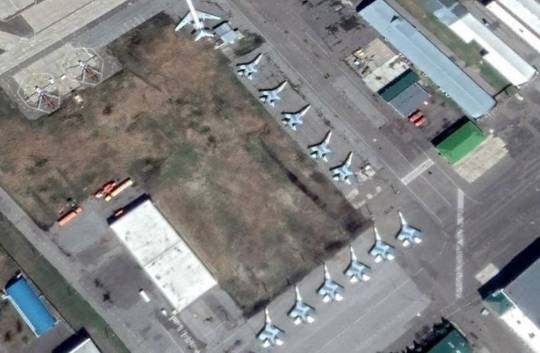
Egyptian Air Force Su-35 fighters parked in the courtyard of the Komsomolsk-on-Amur plant.
An article estimates that 15 Su-35SE fighters can be transferred to Iran in early 2022 if a contract is signed.
The Air Force of the Islamic Republic of Iran (IRIAF) is quite old-fashioned. Most of his fleet consists of F-14As, F-4s and F-5s built in the USA, delivered in the 1960s and 1970s, during the reign of his last shah. Since then, Tehran has acquired MiG-29As from Russia and some Dassault Mirage F-1 from the former Iraqi Air Force that flew to the country during the 1991 Persian Gulf War.
Iran has not bought any new fighter planes since the early 1990s.
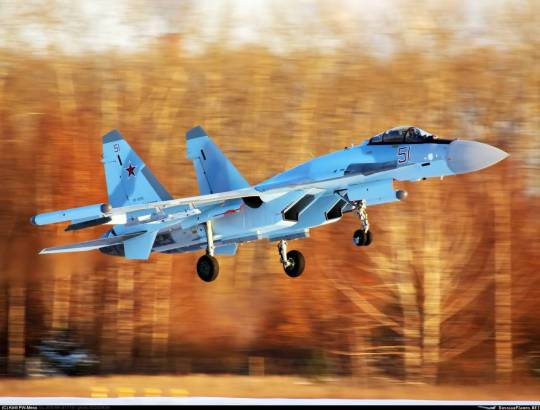
Consequently, the acquisition of two dozen generation 4.5 Su-35SEs - which feature thrust vector and Tikhomirov NIIP N135 Irbis radar engines with passive electronic scanning antenna (PESA) - could strengthen Iran's air power and serve as a temporary solution for the country, as its fighter fleet is gradually updated in the next decade.
Iran wants to buy 24 Su-35 fighters.
Russian or Chinese fighters (or a mixture of the two) have long been seen by experts as the most likely jets ?? that Iran would buy in the 2020s or early 2030.
However, Tehran did not take advantage of previous opportunities to buy modern Russian jets for internal reasons that have to do with the current power structure in Iran.

Shortly after the 2015 nuclear agreement, it was speculated that Iran would take the opportunity to acquire 30 Russian Su-30 jets and 300 T-90 tanks. That didn't happen. Instead of buying 300 T-90 tanks for the Iranian Army, the paramilitaries of the Islamic Revolutionary Guard Corps (IRGC) acquired only 24 and transferred them to Syria to fight alongside the then warring Syrian president Bashar al-Assad.
Under the 2015 nuclear agreement, the UN arms embargo on Iran was scheduled to expire in October 2020. In the months leading up to the expiration date, the U.S. Defense Intelligence Agency (DIA) speculated that Iran could buy S-400s, Su-30 Flankers, Yak-130 trainers and T-90 tanks. The embargo expired more than a year ago and there is little or no evidence that Iran is actively seeking large arms acquisitions.

Military aviation expert Tom Cooper (who wrote extensively about IRIAF) described in 2016 how the system of government in Iran and relations between the IRGC and the regular armed forces would make these major acquisitions highly unlikely.
He is also not convinced today that Iran will acquire the Su-35SEs originally built for Egypt for the same reason.
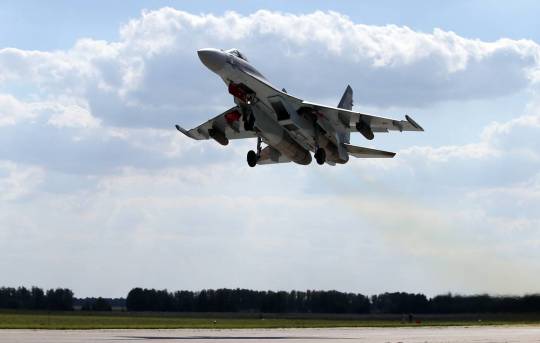
“First of all, I would like to hear that the IRGC granted permission to IRIAF to obtain this type of material and then that Tehran really has the necessary money – before making any kind of useful conclusions,” he wrote on December 30.
Fernando Valduga
Aviation photographer and pilot since 1992, he has participated in several events and air operations, such as Cruzex, AirVenture, Dayton Airshow and FIDAE. He has works published in specialized aviation magazines in Brazil and abroad. Uses Canon equipment during his photographic work throughout the world of aviation.
Cavok Brazil - Digital Tchê Web Creation
10 notes
·
View notes
Link
By CALVIN WOODWARD, ELLEN KNICKMEYER and DAVID RISING
September 10, 2021 GMT
In the ghastly rubble of ground zero’s fallen towers 20 years ago, Hour Zero arrived, a chance to start anew.
World affairs reordered abruptly on that morning of blue skies, black ash, fire and death.
In Iran, chants of “death to America” quickly gave way to candlelight vigils to mourn the American dead. Vladimir Putin weighed in with substantive help as the U.S. prepared to go to war in Russia’s region of influence.
Libya’s Moammar Gadhafi, a murderous dictator with a poetic streak, spoke of the “human duty” to be with Americans after “these horrifying and awesome events, which are bound to awaken human conscience.”
From the first terrible moments, America’s longstanding allies were joined by longtime enemies in that singularly galvanizing instant. No nation with global standing was cheering the stateless terrorists vowing to conquer capitalism and democracy. How rare is that?
Too rare to last, it turned out.
___
Civilizations have their allegories for rebirth in times of devastation. A global favorite is that of the phoenix, a magical and magnificent bird, rising from ashes. In the hellscape of Germany at the end of World War II, it was the concept of Hour Zero, or Stunde Null, that offered the opportunity to start anew.
For the U.S., the zero hour of Sept. 11, 2001, meant a chance to reshape its place in the post-Cold War world from a high perch of influence and goodwill as it entered the new millennium. This was only a decade after the collapse of the Soviet Union left America with both the moral authority and the financial and military muscle to be unquestionably the lone superpower.
Those advantages were soon squandered. Instead of a new order, 9/11 fueled 20 years of war abroad. In the U.S., it gave rise to the angry, aggrieved, self-proclaimed patriot, and heightened surveillance and suspicion in the name of common defense.
It opened an era of deference to the armed forces as lawmakers pulled back on oversight and let presidents give primacy to the military over law enforcement in the fight against terrorism. And it sparked anti-immigrant sentiment, primarily directed at Muslim countries, that lingers today.
A war of necessity — in the eyes of most of the world — in Afghanistan was followed two years later by a war of choice as the U.S. invaded Iraq on false claims that Saddam Hussein was hiding weapons of mass destruction. President George W. Bush labeled Iran, Iraq and North Korea an “axis of evil.”
Thus opened the deep, deadly mineshaft of “forever wars.” There were convulsions throughout the Middle East, and U.S. foreign policy — for half a century a force for ballast — instead gave way to a head-snapping change in approaches in foreign policy from Bush to Obama to Trump. With that came waning trust in America’s leadership and reliability.
Other parts of the world were not immune. Far-right populist movements coursed through Europe. Britain voted to break away from the European Union. And China steadily ascended in the global pecking order.
President Joe Biden is trying to restore trust in the belief of a steady hand from the U.S. but there is no easy path. He is ending war, but what comes next?
In Afghanistan in August, the Taliban seized control with menacing swiftness as the Afghan government and security forces that the United States and its allies had spent two decades trying to build collapsed. No steady hand was evident from the U.S. in the harried, disorganized evacuation of Afghans desperately trying to flee the country in the first weeks of the Taliban’s re-established rule.
Allies whose troops had fought and died in the U.S-led war in Afghanistan expressed dismay at Biden’s management of the U.S. withdrawal, under a deal President Donald Trump had struck with the Taliban.
THE ‘HOMELAND’
In the United States, the Sept. 11 attacks set loose a torrent of rage.
In shock from the assault, a swath of American society embraced the us vs. them binary outlook articulated by Bush — “Either you are with us, or you are with the terrorists” — and has never let go of it.
You could hear it in the country songs and talk radio, and during presidential campaigns, offering the balm of a bloodlust cry for revenge. “We’ll put a boot in your ass, it’s the American way,” Toby Keith promised America’s enemies in one of the most popular of those songs in 2002.
Americans stuck flags in yards and on the back of trucks. Factionalism hardened inside America, in school board fights, on Facebook posts, and in national politics, so that opposing views were treated as propaganda from mortal enemies. The concept of enemy also evolved, from not simply the terrorist but also to the immigrant, or the conflation of the terrorist as immigrant trying to cross the border.
The patriot under threat became a personal and political identity in the United States. Fifteen years later, Trump harnessed it to help him win the presidency.
THE OTHERING
In the week after the attacks, Bush demanded of Americans that they know “Islam is peace” and that the attacks were a perversion of that religion. He told the country that American Muslims are us, not them, even as mosques came under surveillance and Arabs coming to the U.S. to take their kids to Disneyland or go to school risked being detained for questioning.
For Trump, in contrast, everything was always about them, the outsiders.
In the birther lie Trump promoted before his presidency, Barack Obama was an outsider. In Trump’s campaigns and administration, Muslims and immigrants were outsiders. The “China virus” was a foreign interloper, too.
Overseas, deadly attacks by Islamic extremists, like the 2004 bombing of Madrid trains that killed nearly 200 people and the 2005 attack on London’s transportation system that killed more than 50, hardened attitudes in Europe as well.
By 2015, as the Islamic State group captured wide areas of Iraq and pushed deep into Syria, the number of refugees increased dramatically, with more than 1 million migrants, primarily from Syria, Afghanistan and Iraq, entering Europe that year alone.
The year was bracketed by attacks in France on the Charlie Hebdo magazine staff in January after it published cartoons of the Prophet Muhammad, and on the Bataclan theater and other Paris locations in November, reinforcing the angst then gripping the continent.
Already growing in support, far-right parties were able to capitalize on the fears to establish themselves as part of the European mainstream. They remain represented in many European parliaments, even as the flow of immigrants has slowed dramatically and most concerns have proved unfounded.
THE UNRAVELING
Dozens of countries joined or endorsed the NATO coalition fighting in Afghanistan. Russia acquiesced to NATO troops in Central Asia for the first time and provided logistical support. Never before had NATO invoked Article 5 of its charter that an attack against one member was an attack against all.
But in 2003, the U.S. and Britain were practically alone in prosecuting the Iraq war. This time, millions worldwide marched in protest in the run-up to the invasion. World opinion of the United States turned sharply negative.
In June 2003, after the invasion had swiftly ousted Saddam and dismantled the Iraqi army and security forces, a Pew Research poll found a widening rift between Americans and Western Europeans and reported that “the bottom has fallen out of support for America in most of the Muslim world.” Most South Koreans, half of Brazilians and plenty more people outside the Islamic world agreed.
And this was when the war was going well, before the world saw cruel images from Abu Ghraib prison, learned all that it knows now about CIA black op sites, waterboarding, years of Guantanamo Bay detention without charges or trials — and before the rise of the brutal Islamic State.
By 2007, when the U.S. set up the Africa Command to counter terrorism and the rising influence of China and Russia on the continent, African countries did not want to host it. It operates from Stuttgart, Germany.
THE SUCCESSES
Over the two decades, a succession of U.S. presidents scored important achievements in shoring up security, and so far U.S. territory has remained safe from more international terrorism anywhere on the scale of 9/11.
Globally, U.S.-led forces weakened al-Qaida, which has failed to launch a major attack on the West since 2005. The Iraq invasion rid that country and region of a murderous dictator in Saddam.
Yet strategically, eliminating him did just what Arab leaders warned Bush it would do: It strengthened Saddam’s main rival, Iran, threatening U.S. objectives and partners.
Deadly chaos soon followed in Iraq. The Bush administration, in its nation-building haste, failed to plan for keeping order, leaving Islamist extremists and rival militias to fight for dominance in the security vacuum.
The overthrow of Saddam served both to inspire and limit public support for Arab Spring uprisings a few years later. For if the U.S. showed people in the Middle East that strongmen can be toppled, the insurgency demonstrated that what comes next may not be a season of renewal.
Authoritarian regimes in the Middle East pointed to the post-Saddam era as an argument for their own survival.
The U.S.-led wars in Afghanistan and Iraq killed more than 7,000 American military men and women, more than 1,000 from the allied forces, many tens of thousands of members of Afghan and Iraqi security forces, and many hundreds of thousands of civilians, according to Brown University’s Costs of War project. Costs, including tending the wars’ unusually high number of disabled vets, are expected to top $6 trillion.
For the U.S., the presidencies since Bush’s wars have been marked by an effort — not always consistent, not always successful — to pull back the military from the conflicts of the Middle East and Central Asia.
The perception of a U.S. retreat has allowed Russia and China to gain influence in the regions, and left U.S. allies struggling to understand Washington’s place in the world. The notion that 9/11 would create an enduring unity of interest to combat terrorism collided with rising nationalism and a U.S. president, Trump, who spoke disdainfully of the NATO allies that in 2001 had rallied to America’s cause.
Even before Trump, Obama surprised allies and enemies alike when he stepped back abruptly from the U.S. role of world cop. Obama geared up for, then called off, a strike on Syrian President Bashar Assad for using chemical weapons against his people.
“Terrible things happen across the globe, and it is beyond our means to right every wrong,” Obama said on Sept. 11, 2013.
THE NEWISH ORDER
The legacies of 9/11 ripple both in obvious and unusual ways.
Most directly, millions of people in the U.S. and Europe go about their public business under the constant gaze of security cameras while other surveillance tools scoop up private communications. The government layered post-9/11 bureaucracies on to law enforcement to support the expansive security apparatus.
Militarization is more evident now, from large cities to small towns that now own military vehicles and weapons that seem well out of proportion to any terrorist threat. Government offices have become fortifications and airports a security maze.
But as profound an event as 9/11 was, its immediate effect on how the world has been ordered was temporary and largely undone by domestic political forces, a global economic downturn and now a lethal pandemic.
The awakening of human conscience predicted by Gadhafi didn’t last. Gadhafi didn’t last.
Osama bin Laden has been dead for a decade. Saddam was hanged in 2006. The forever wars — the Afghanistan one being the longest in U.S. history — now are over or ending. The days of Russia tactically enabling the U.S., and China not standing in the way, petered out. Only the phoenix lasts.
___
Rising reported from Bangkok; Knickmeyer and Woodward from Washington. AP National Security Writer Robert Burns contributed to this report.
https://apnews.com/article/911-20-years-world-affairs-cc497f11743fcbd48b0b3e0c3ed2da5f
19 notes
·
View notes